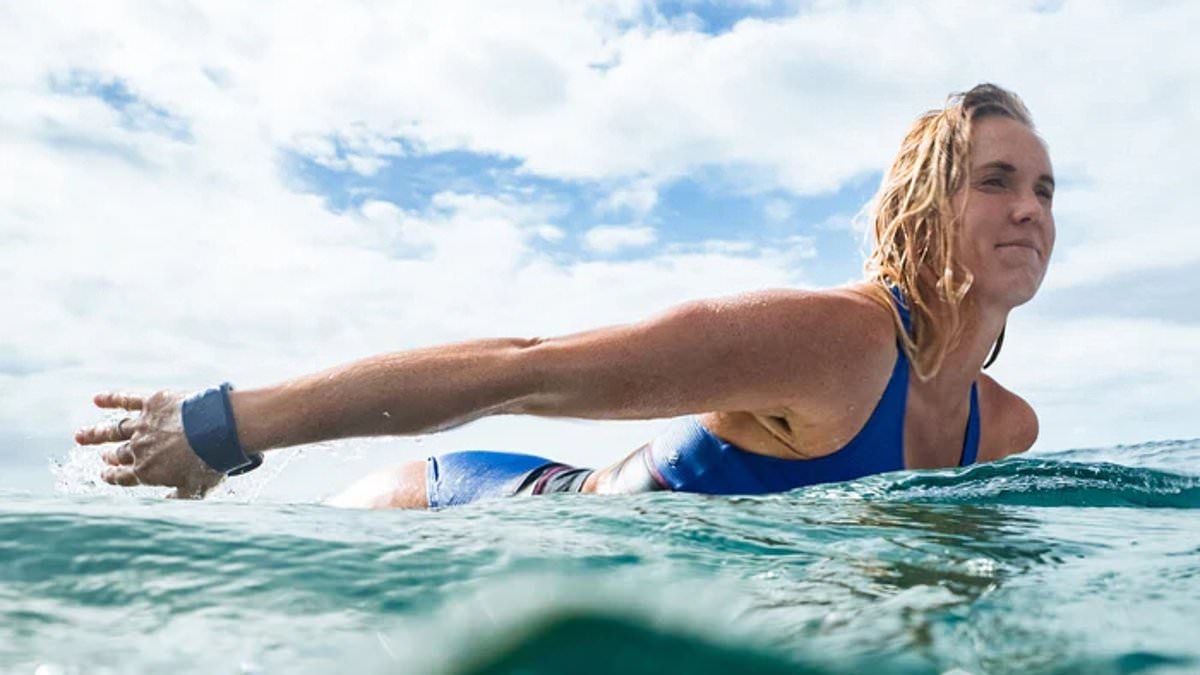Surfer and shark attack survivor Bethany Hamilton has been slammed for promoting a product that promises to deter ocean predators – but critics say the gadget has little to no effect.
Hamilton, 34, who was attacked by a 14-foot shark while surfing in 2003 and had her left arm amputated, posted a video to her Instagram page on Monday promoting Sharkbanz – wearable devices that claim to deter sharks and other ocean predators using an electromagnetic field.
‘Sharkbanz are designed to help you overcome your fear of sharks and minimize the risk,’ the video said, with a clip of her surfing. ‘I’m cheering you on to overcome and have fun.’
But the mother-of-four quickly was inundated with backlash on the video, with streams of viewers taking issue with not only the purported abilities of the device, but her support of it as a shark attack victim.

Surfer Bethany Hamilton, 34, has been slammed for promoting Sharkbanz
One person noted the recent string of shark attacks in Florida and wrote it was ‘incredibly insensitive trying to capitalize on the fear’.
Others shared their beliefs stating it would not appropriately protect those in the water, with one person claiming a Sharkbanz ‘most likely has little to no effect.’
Another compared the products to ‘those scam bracelets that supposedly give some good vibes in your life,’ while a fourth derided the devices as ‘gimmicks’ like ‘shark repellants to even thinking that certain colors attract sharks.’
‘The true bottom line is… if you are so afraid of sharks don’t go in the water,’ he wrote.
Josh Schellenberg, an underwater photographer who often takes close-up pictures of sharks, also claimed Sharkbanz are ‘great for a false sense of security.’
The company says that its $128 devices create powerful electromagnetic fields that alerts a shark’s sensory organ ‘to stay away.’
Hamilton is now partnering with Sharkbanz on its first Signature Edition line of its Sharkbanz 2 product and ‘to promote mindfulness in all areas of our lives,’ according to the company’s website.


Critics claim the wearable devices have little to no effect in reducing shark attacks
But Schellenberg noted that in 2016, a 16-year-old South Florida surfer Zack Davis was wearing one of the devices when a black-tip shark attacked him and bit into his right arm.
‘It was supposed to keep sharks away, and the first time I wore it I got bit,’ Davis told CBS 12 of the device he got for Christmas.
He spent 24 hours in the hospital, and had to receive 44 stitches.
Schellenberg also claimed that one of his friends was testing out the products and wound up ‘hand-feeding’ the sharks.
‘When it didn’t stop the sharks from approaching him, he fed one and gave another one nose rubs,’ Schellenberg wrote.
‘The sharks didn’t care he was wearing it!’
At that point, another replied that he studies natural and electro magnets, and reviewed some research on Sharkbanz.
‘Realistic[ally], the shark would have to be smaller in size and literally up against it to feel any sort of sensation.’

Another Instagram user said it was ‘incredibly insensitive’ for Hamilton ‘to capitalize on the fear instilled’ from recent shark attacks in Florida
In fact, a 2018 peer-reviewed study determined that Sharkbanz ‘had limited or no measurable effect on white shark behavior.’
And Daryl McPhee, an associate professor at Bond University in who received government funds to study unprovoked shark attacks told Forbes that Sharkbanz and other similar devices have undergone ‘only limited independent testing’ that shows ‘a very limited deterrent effect’.
Sharkbanz executives, however, have defended their products – with co-founder Nathan Garrison telling DailyMail.com that hundreds of customers have had ‘incredible experiences’ and have said the devices ‘possibly saved their lives.’
He noted that the company has already been around for 10 years, and said scientists spent two decades perfecting the technology.
T he company has hours worth of footage showing its products deterring sharks – including a 10-foot long hammerhead, he claimed.
‘Several individuals have called to tell me the product possibly saved their lives, expressing sincere thanks,’ he told Forbes.
‘Navy SEALs, Coast Guard rescue and foreign military operations use Sharkbanz because they have seen the effects and enjoyed the benefits.’

Sharkbanz claims its devices produce powerful electromagnetic fields that alerts a shark’s sensory organ ‘to stay away’
Garrison also claimed that Davis accidentally landed near the shark after he fell on a wave and provoked it when he was bit in 2016, and argued that the 2018 peer-reviewed study was flawed.
He claimed it was funded by one of their competitors, which also helped design the experiments – which he said did not apply the product correctly.
The bait the scientists were using was a tuna gill, which can be very attractive to a shark, and the device was placed too far away from the bait to be effective.
‘The intention is not to stop a great white from eating a tuna head when it’s right in front of it,’ Garrison said, arguing that the study should be taken ‘with a grain of salt.’
Other, ‘extensive’ studies, he said, have proven the products are successful at deterring sharks.
‘It is a proven fact beyond any reasonable doubt that our products (and strong permanent magnets) create avoidance behavior in sharks,’ Garrison told DailyMail.com. ‘This is indisputable.’
Still, he admitted that the devices are not 100% effective and ‘never will be.’
‘But I’d much rather use something that’s proven to reduce my chances than rely on luck alone,’ he said.
DailyMail.com has approached Hamilton for comment.
